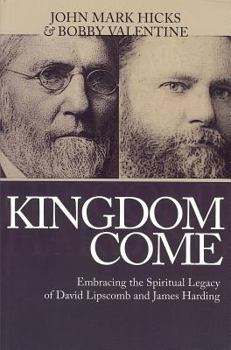Kingdom Come: Embracing the Spiritual Legacy of David Lipscomb and James Harding
Book by John Mark Hicks, Bobby Valentine This description may be from another edition of this product.
Format:Hardcover
Language:English
ISBN:0976779064
ISBN13:9780976779063
Release Date:May 2006
Publisher:Not Avail
Length:224 Pages
Weight:0.55 lbs.
Customer Reviews
2 ratings
A Forgotten Spirituality
Published by Thriftbooks.com User , 17 years ago
Kingdom Come is a book whose time is long overdue. Finally a book that takes seriously and explores in depth the grace-centered, counter-cultural theology of two giants among Churches of Christ from the mid-19th and early 20th centuries, Elders James A. Harding (1848-1922) and David Lipscomb (1831-1917). While not ignoring these men's roles in the brotherhood disputes that ultimately led to the 1906 split bewteen the Disciples of Christ and the Church of Christ (both men acted on principle in this matter, and Lipscomb in particular resisted choosing sides until he felt he had no choice), the book nevertheless finds much to commend in their deeply grace-centered, counter-cultural theology, a theology of grace and an openness to the power of the Holy Spirit that predominated in many sections of the Brotherhood until the mid-twentieth century. Valentine has argued persuasively elsewhere that a kind of religious modernism overcame large segments of the Church of Christ beginning in the early years of the twentieth century. The early grace-centered, counter-cultural, pacifistic unity and reform-driven impetus of the Stone-Campbell Reformation was largely abandoned in favor of a cold, legalistic theology in which much more attention was given to ecclesiology, plans and patterns and a correct understanding of baptism; the role and work of the Holy Spirit was relegated to a "Word-only" operation on the believer as he or she read the Bible, and the literal indwelling was explained away as so much "denominational twaddle" in the words of one early "Word-only" advocate. The book examines for example, Lipscomb's forgotten pacifism and aversion to Christian participation in civil government; indeed Foy E. Wallace, Jr., referred to Lipscomb's 1889 book "Civil Government" as "about as rank with false doctrine as one little book of its size could be," and suggested that anyone owning a copy should burn it! Consequently, Lipscomb is primarily remembered in Churches of Christ for his largely conservative stance on the issues that lead to the split; Lipscomb's counterculturalism and premillennial leanings, not to mention his progressive views regarding racial equality in the church, are less well-known, and often overlooked in published biographies of the man. As well, Harding's opposition to modernistic, rationalistic trends among Churches of Christ and his fight for an understanding of the literal indwelling of the Holy Spirit in each baptized believer, as opposed to the predominant "Word-only" theory is also not often known. The authors also show us what impact the theology of Lipscomb and Harding, transmitted in large part through their Nashville Bible School (NBS), had on other well-known evangelists in our brotherhood, such as Robert H. Boll (1875-1956) and Grover Cleveland "G. C." Brewer (1884-1956). The authors are to be commended for restoring the "distant voices" of Harding and Lipscomb to modern readers; like the "founders" Barton W. Stone and Alex
Challenging, thought-provoking, even a bit disturbing...
Published by Thriftbooks.com User , 18 years ago
Anybody who is serious about their Christian walk needs to read a book like this. Genuine Christianity is inherently counter-cultural, and this book makes this point time and again by looking at some of the 'lost history' of churches of Christ. Most chapters are divded into three sections. The first portion gives historical evidences of ways in which David Lipscomb and James A. Harding (and, to a lesser extent, such successors to their traditions like RH Boll and JH Armstrong) lived out their understanding of Christ and his church; the second gives evidence as to why their understandings and lifestyles were solidly Biblical, and the final portion of each chapter tries to make this more applicable to the reader. At times the applications are perhaps not always clear, but this could possibly come from my own immersion with modern culture. Our selling out to the ways of the world makes the reality of Biblical teaching to be what is difficult; perhaps this is why such books (as well as reading scripture itself, especially the gospels and prophets) are so important in our modern, increasingly secularistic world. Such counter-cultural ideas, even if they are old and true, do not allow us to be comfortable, which for many has become the ultimate goal of life.






